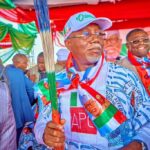The Nigerian Communications Commission (NCC) has decried the activities of state Ministries, Departments and Agencies (MDAs), saying their activities are hampering deployment of critical ICT infrastructure for national development.
The commission’s executive commissioner, stakeholder management, Mr Sunday Dare made this known at the stakeholders parliament with the theme ‘Optimising the benefits of telecoms infrastructure in Nigeria’ in Lokoja Kogi State.
Dare represented by deputy director, legal and regulatory services, G.T Mohammed, restated the commission’s concern that progress in the telecommunications sector is being hampered by activities of some MDAs which recuse to grant required approvals timeously, who impose inordinate charges for build approvals and Rights-of-way, and who frequently interfere with operations of such infrastructure by shutting them down at will, saying citizens suffer when industry faces challenges of this nature.
“In this regard, we are concerned that preparations foe this parliament were unfortunately overshadowed by events in the past two weeks which saw Kogi State Internal Revenue Agency sealing up some Base Transceiver Stations (BTS) sites around the state. To emphasize the interconnectedness of the national telecoms network, we should note that although less than 20 BTS sites were shut down, but because many of these were “hub” sites, their being ‘off-line’ immediately affected over 150 BTS sites in Nasarawa, Benin, Enugu, Anambra, Edo, Ondo, Ekiti, Kwara, Niger State and the FCT. This led to outages and service degradation which affected millions of innocent telecoms users across these other states.
“If we were to quantify the monetary impact of the disruptions to communications, banking (PoS, ATMs, etc.), security, health and other platforms which rely on these infrastructure, I am sure the national economy would have lost billions of Naira during that short period. we must avoid this kind of disruptions at all costs,” he said.
Reacting to the development, Kogi State director of Urban and Regional Planning Board, town planner (TPL) Rikiya Ibrahim, urged the affected operators to engage and dialogue with the state, emphasizing the need for operators to consult with the appropriate state agencies to forestall incidences of BTS sealing and other sanctions, stressing states must execute their mandates.
 Join Daily Trust WhatsApp Community For Quick Access To News and Happenings Around You.
Join Daily Trust WhatsApp Community For Quick Access To News and Happenings Around You.


